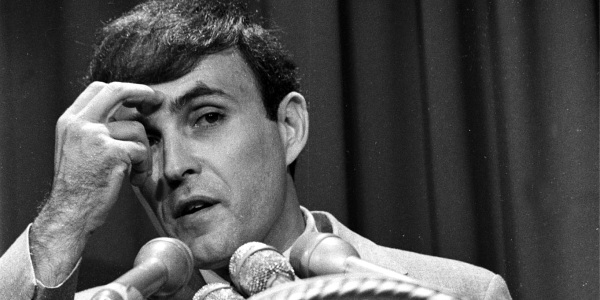Let us say a sincere, “Thank you, Rudy Giuliani.”
The former New York City mayor, who dropped out of the presidential race Wednesday, has served as teacher in charge of the after-school remedial class for political junkies.
The lesson we never seem to learn: Early national polls do not matter.
Now let’s write that a hundred times on the blackboard: Early national polls do not matter.
From the first national surveys in early 2007, the former mayor, or “America’s mayor” as he was known in those days, was ahead of his rivals for the GOP nomination: A USA Today/Gallup poll in February 2007 had the race at Giuliani 44 percent to Sen. John McCain’s 20 percent.
Even as late as November 2007, an NBC News/Wall Street Journal national survey indicated that Giuliani was still the leader in the Republican race with 33 percent.
The only Republican to come close was McCain, with 16 percent.
Before the votes were cast
There was only one problem with those surveys: Not one vote by one flesh-and-blood voter had yet been cast.
Nothing real had yet happened to influence the minds of voters.
Florida voters who cast their ballots on Tuesday said they were influenced by the results of previous contests in Iowa, New Hampshire, Michigan and South Carolina, where living and breathing Republican voters made their choices.
Giuliani had not really competed in any of those elections, and, of course, he’d won none of them. “He shot himself in the foot,” Republican John Billings of Fernandina Beach, Fla., said the day before his state's primary.
Slideshow 28 photos
Rudy Giuliani
So the 2008 Republican presidential nominee, Rudy Giuliani, joins the pantheon of other famous hypothetical nominees, such as 2004 Democratic presidential nominee Sen. Joe Lieberman, who according to a Gallup survey of Democrats in April 2003 was the front-runner for the 2004 Democratic nomination.
Polls picked Cuomo in '92
And don’t forget the 1992 Democratic presidential nominee: Mario Cuomo.
New York’s governor at the time, Cuomo in February 1991 was the favorite of Democrats in the Gallup Poll.
These surveys measured name recognition and they were national in scope, so they caught in their dragnet people who were not focused on the presidential race and did not live in states, such as New Hampshire, where the early primaries were held.
In New Hampshire, where people were much more focused on the presidential race, and where Giuliani’s socially libertarian views would be expected to give him cross-over appeal to independents, one poll showed that he had a big early lead: A Suffolk University poll of New Hampshire voters in February of 2007 had Giuliani at 37 percent, 10 points ahead of McCain.
But Giuliani’s New Hampshire polling trend line headed downward as soon as more voters started to pay attention in the fall of 2007.
By October and November, surveys of New Hampshire voters showed Giuliani averaging 20 percent of the vote, trailing then-leader Mitt Romney by about 10 points.
This decline occurred even before Giuliani made his decision to focus exclusively on Florida.
The same decline was true in Florida: The Giuliani polling trend line was down, as soon as Florida voters began to see real results from the Iowa caucuses and New Hampshire primary in the first two weeks of January.
What happened in Florida?
He began his quest for the nomination at a distinct disadvantage since so many Republican voters disagreed with him on core social issues.
Yet, in Florida on Tuesday, exit poll interviews showed that even among socially libertarian voters, Giuliani had fizzled.
Thirty percent of the Republicans who voted in Florida said they believed abortion should be legal in most cases, which is pretty much Giuliani’s view as well.
He got only 16 percent of such voters, as McCain drew 44 percent of them, and Romney, formerly an abortion rights Republican himself before his conversion, got 29 percent.
But in 2006 and early 2007, Giuliani’s nomination did seem like a plausible idea — on paper.
As late as December, with Sen. Barack Obama surging ahead of Sen. Hillary Clinton in Iowa, Giuliani campaign manager Mike DuHaime insisted, “Rudy’s the best candidate against any person. ... Look at the tristate area: New York, New Jersey and Connecticut, states that typically vote Democratic. Rudy is even stronger if you’re running against someone who’s not from New York."
He went on, "Rudy’s the only Republican who puts very specific Democratic states in play, which is very important when you look at the financial advantage that the Democrats have. ... Democrats would have to fight for their own territory, which they would not have to do against any other Republican.”
One purpose of primary elections is to separate the hypothetical presidential nominee from the actual — to test whether a national survey of name recognition has any validity as the election starts to become real.
On Tuesday, Florida voters again underscored the lesson: Early national polls do not matter.
